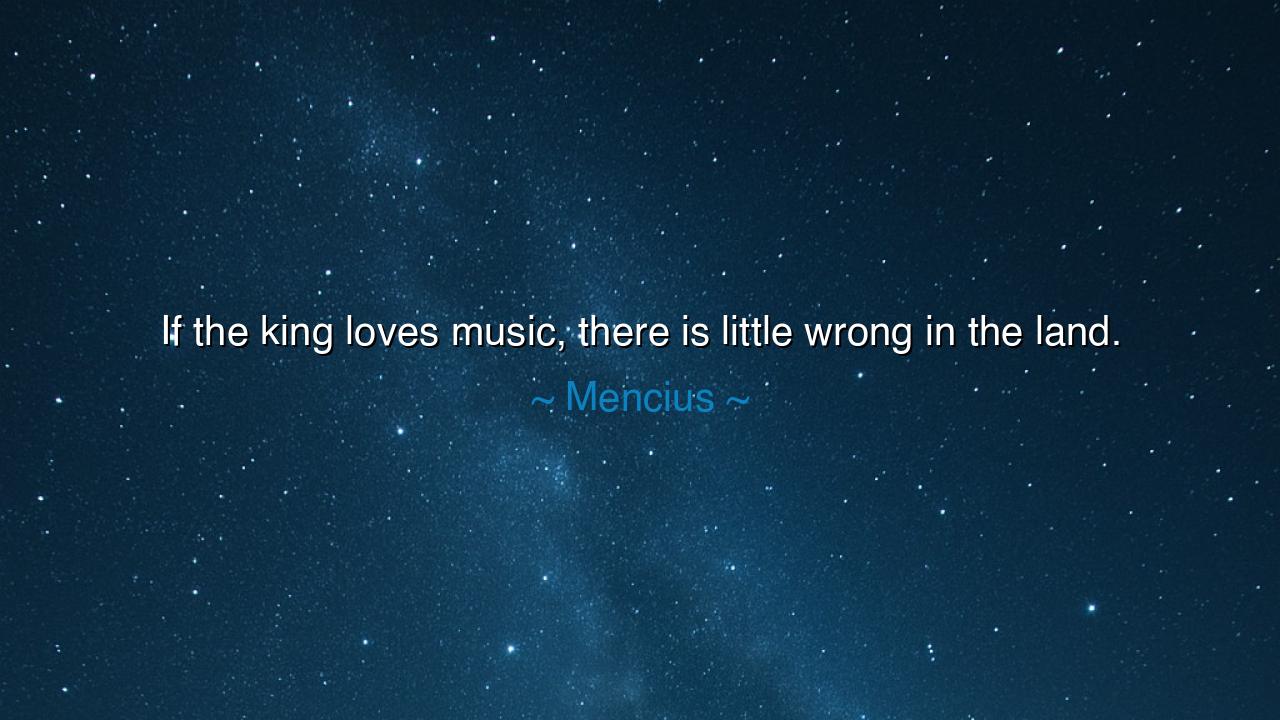
If the king loves music, there is little wrong in the land.






Hear, O children of wisdom, the words of Mencius, the great disciple of Confucius, who declared: “If the king loves music, there is little wrong in the land.” These words, though simple in sound, carry the weight of kingdoms. For they reveal that the heart of the ruler shapes the heart of the nation, and that the love of music, symbol of harmony and order, is a sign that the people will dwell in peace. When the one who wears the crown delights in harmony, the land itself is tuned like a well-strung instrument, producing unity instead of discord.
For in the ancient teaching of the sages, music was more than entertainment—it was the very language of virtue, the sound of balance between heaven and earth. When the king loved music, it meant his soul resonated with order, beauty, and righteousness. Such a ruler governed not by tyranny but by harmony, not by cruelty but by compassion. His love of music reflected a heart attuned to the rhythms of justice, and when the highest seat is set in order, the whole land follows in step.
Behold the story of King David of Israel. He was a warrior, yes, but he was also a poet and a musician, who lifted the harp and sang psalms to the Lord. His love of music not only brought him personal solace but also united his people in worship and identity. In moments of despair, his songs restored courage; in times of triumph, they gave thanks. The harmony he cultivated within himself through song spilled outward into the governance of his people, reminding them of divine order and hope.
Contrast this with tyrants whose hearts were deaf to music. Nero of Rome, though a pretender to artistry, twisted melody into vanity and cruelty, neglecting the true harmony of justice. He played while his city burned, using music as mockery rather than as order. Such a ruler could not bring peace, for he was out of tune with both heaven and man. Thus, we see the truth of Mencius’s wisdom: the spirit in which a ruler holds music reveals whether the land will flourish or suffer.
The teaching, however, extends beyond kings and nations. Every man is king over his own house, his own affairs, his own soul. If he loves music—not only in sound, but in spirit—he brings harmony to his family, peace to his labors, and order to his community. If he despises harmony and chooses noise, strife, and disorder, then wrong multiplies around him. To love music, in its deepest sense, is to love balance, virtue, and unity.
Therefore, the lesson is clear: seek to cultivate harmony in your own heart as a ruler should in his land. Listen not only to the melodies of instruments but to the music of justice, kindness, and truth. Let your life be as a song rightly played, where every action is a note in the greater symphony of creation. In so doing, you create peace around you, and little wrong can take root in your midst.
Practical wisdom calls you to action: invite music into your home, for it softens anger and binds hearts together. Practice harmony in your speech and deeds, for these are also forms of music. And when you find yourself in power, whether great or small, remember that your love of harmony will shape the lives of those you lead. Let the rulers of today hear this wisdom of Mencius: if you would heal the land, first learn to love the music of order, compassion, and peace.
Thus, beloved, take this teaching into your hearts. For though crowns are rare, every soul is a ruler of its own domain. And if the king within you loves music, then surely there will be little wrong in your life, and the world around you will echo with harmony.






AAdministratorAdministrator
Welcome, honored guests. Please leave a comment, we will respond soon